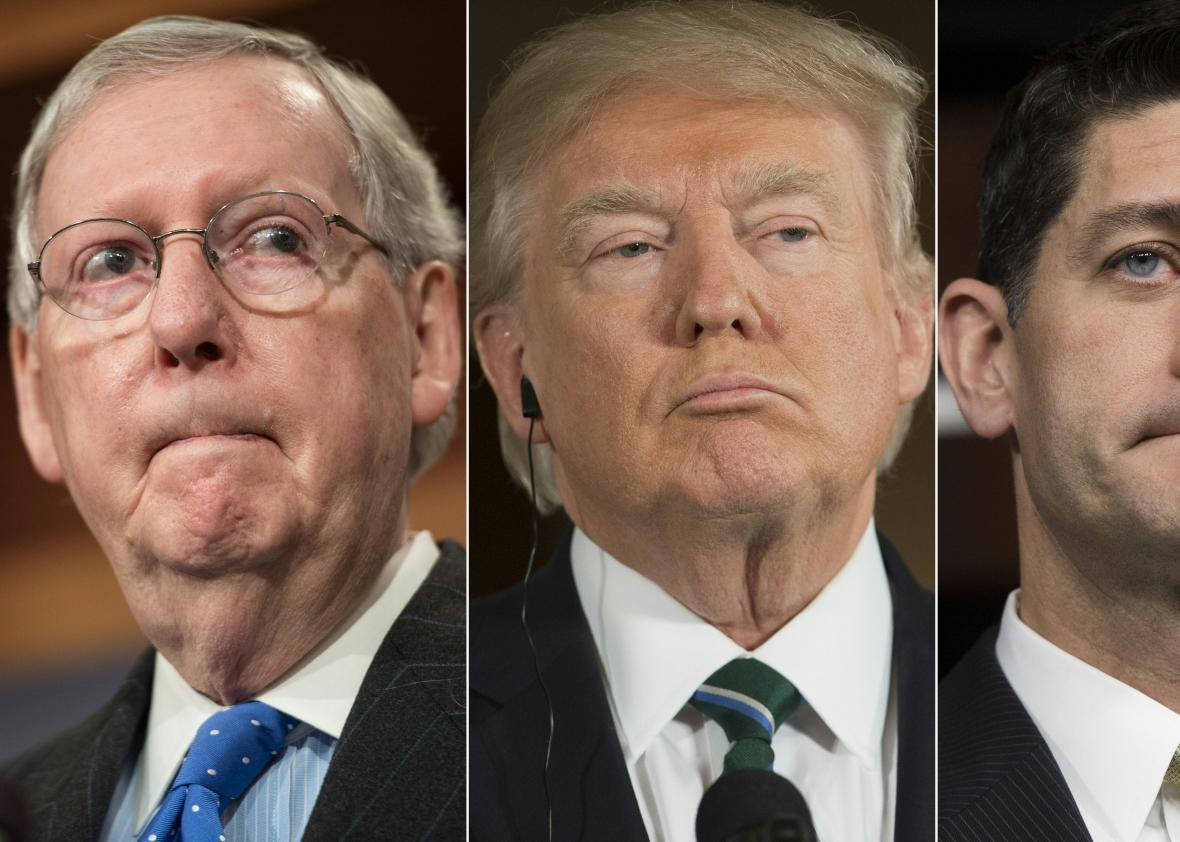President Trump, having secured no “wall money” in the latest congressional funding fight in April, vowed to try again before federal appropriations expire at the end of September. At his Phoenix rally on Tuesday night, the president promised the crowd that, even “if we have to close down our government, we’re building that wall.” As if a lapse in appropriations automatically converts into wall funding, as opposed to a tedious federal standoff that damages the unified governing party.
The reaction on the Hill to Trump’s threat has been a chorus of bless his heart. Both House Minority Leader Nancy Pelosi and Senate Minority Leader Chuck Schumer, recognizing that the wall is not a priority outside of Trump’s base, are comfortable with their leverage. “If the President pursues this path, against the wishes of both Republicans and Democrats, as well as the majority of the American people,” Schumer said in a terse statement, “he will be heading towards a government shutdown which nobody will like and which won’t accomplish anything.” Pelosi, meanwhile, promised that “Democrats will stand fast against the immoral, ineffective border wall and the rest of Republicans’ unacceptable poison pill riders.”
Senate and House Republicans claim that they’re trying to help Trump get his wall money, but they’re hesitant to commit to how far they’re willing to go. Earlier this month, Paul Ryan produced a techno-soundtracked web video (hell yeah) about how “it’s time” to build the wall, and the House passed $1.6 billion in wall and other border security funding in the spending package it approved before recess. But that spending package was little more than a show vote the House made to give its members something to talk about on recess. The real spending deal, as always, will be made between Democratic and Republican appropriators in private negotiations, and appropriators have little patience for ideological quests. When asked for his response Wednesday to Trump’s threat, our techno-pumping, wall-loving, bad-ass House speaker said that “I don’t think a government shutdown is necessary and I don’t think most people want to see a government shutdown, ourselves included.”
Meanwhile, Senate Majority Whip John Cornyn said Wednesday that he viewed Trump’s threat as him “laying down the tough line,” i.e., a negotiation tactic. “Obviously, we need to get the border secured, and we’ve come up with a plan to do that. And we need to pass that legislation, I think, and then we can go back and appropriate the money to complete the bill on the incremental basis.” Translation: There is not much appetite within the Senate Republican caucus for shutting down the government over the wall.
Neither Trump nor Hill Democrats seem interested in budging in their positions, and both Hill Democrats and Hill Republicans seem to think that a government shutdown over the wall would fare poorly for Hill Republicans. Worsening Republicans’ conundrum, the shutdown will be extra bad when Trump tells his base to blame the mess on the GOP Congress. It’s almost like Republican lawmakers just can’t win with this guy in office.
The real discussions between Democrats and Republicans, once Congress returns after Labor Day, will be about finding some compromise that allows Trump to save face and Democrats to declare victory. That could mean funding certain Democratic policy priorities, like the Affordable Care Act’s cost-sharing reduction payments, while giving the president additional funds for replacement fencing or other border security technology. If Trump demands a concrete wall, it is hard to see Democrats agreeing to it or Republicans going to bat for it.
If Trump’s ultimatum is that it’s either a wall or shutdown, we could see the standoff end with the first major legislative break—i.e., not just the occasional Twitter bickering—between congressional Republicans and the president. Given the president’s tendency to hold a grudge, such a break could set the tone for the rest of his term.
House and Senate Republican leaders, recognizing that a shutdown could be punishing for their majorities, might decide to send Trump a bipartisan bill to the president’s desk that dodges hot-button issues altogether. That would put ownership of a prolonged shutdown squarely on the president’s shoulders if he chose to veto it. For all of the punditry trying to ascertain if there’s been a true break between Hill Republicans and the president over his difficult last few weeks, divining meaning from cryptic statements won’t be necessary much longer. It will materialize legislatively.
